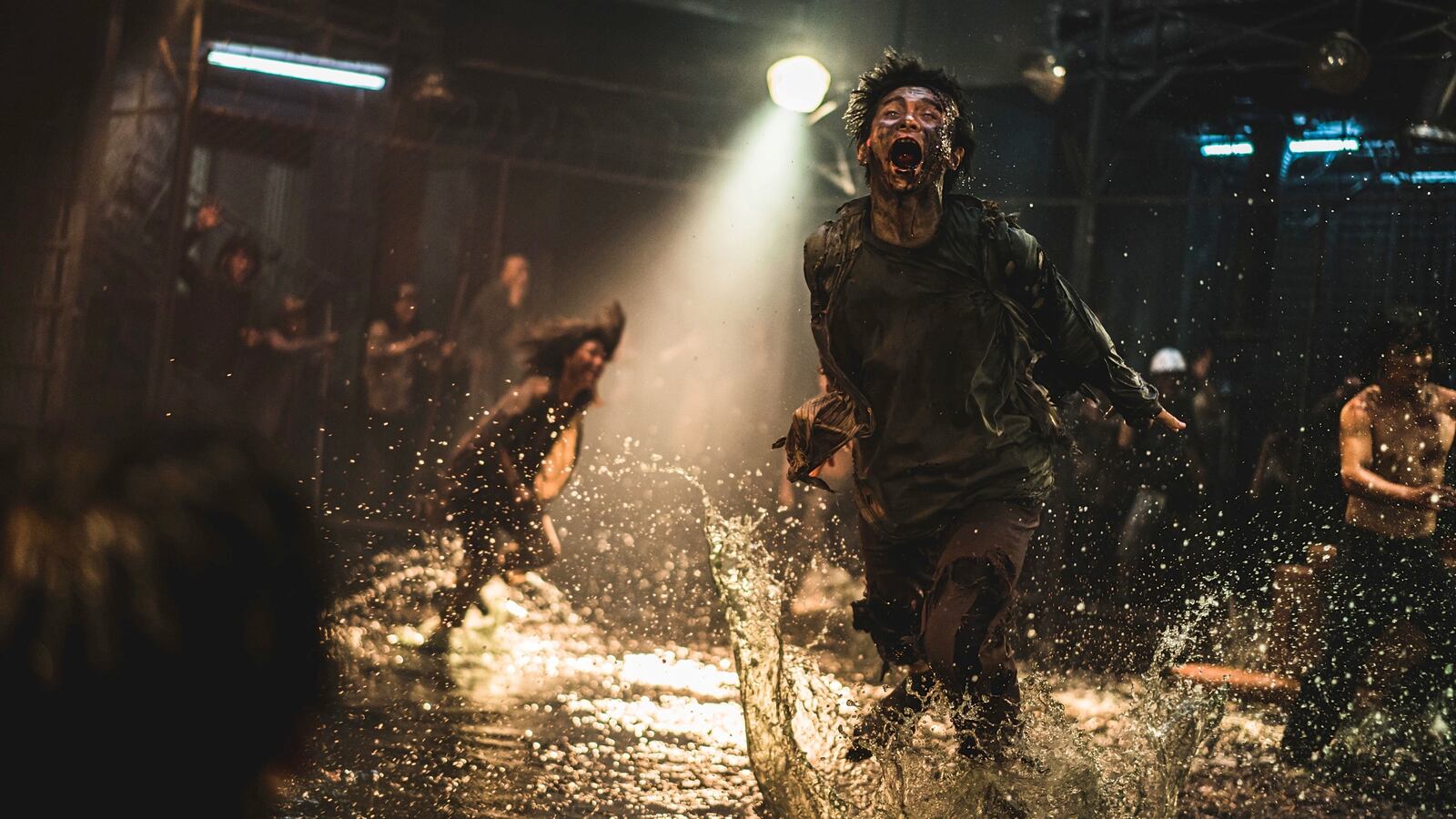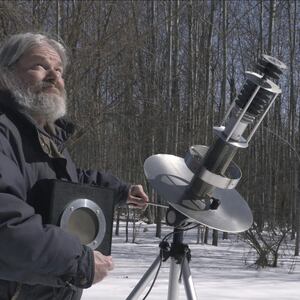A highly contagious virus spreading rapidly through a crowded indoor space populated by individuals who sometimes put their own interests ahead of those of their fellow man, and a quarantine zone-enforcing government that offers false assurances that everything’s okay and everyone is safe—2016’s Train to Busan is a modern zombie classic that becomes more horrifyingly timely by the minute. Thus, it’s an ideally disquieting moment for the debut of writer/director Yeon Sang-ho’s sequel, Train to Busan Presents: Peninsula, a follow-up that amplifies everything about its predecessor—for better and worse—while staying true to its core values.
Debuting on VOD on Friday, Aug. 21, Peninsula’s prologue is set amidst the initial South Korean undead outbreak, with military captain Jung-seok (Gang Dong-won) speeding his sister (Jang So-yeon), brother-in-law Chul-min (Kim Do-yoon), and nephew Dong-hwan (Moon Woo-jin) to a transport ship that will carry them to safe harbors in Hong Kong. Along the way, Jung-seok refuses to provide a ride for a family in need, thus marking him as the same sort of me-first protagonist as Train to Busan’s Seok-woo (Gong Yoo). Regardless of his priorities, though, Jung-seok can’t protect anyone from impending calamity. Once aboard the ship, an infected passenger chomps his way through steerage, transmitting his disease to others, including Jung-seok’s sister and her child, who are devoured as Jung-seok and Chul-min watch in helpless horror.
Four years later, the entire Korean peninsula has been cordoned off, and Jung-seok and Chul-min are bitter with their lot in life, and with each other. Nonetheless, their American crime boss is uninterested in such personal tensions, and orders them—as well as two other Korean expats—to travel from Hong Kong, where they’re vilified as untrustworthy outsiders, back to South Korea to retrieve a truck loaded with $20 million. This is obviously a foolish plan even if carried out in the dead of night (when the zombies are effectively blind). However, with few financial options, Jung-seok and Chul-min sign up for the venture.
Upon returning to Korea, what they find is a no man’s land that resembles the post-apocalyptic urban landscapes of The Last of Us, all decaying cars, ruined high-rises, crumbling bridges and wild foliage that’s spread over modern structures like a pestilence. While finding the truck turns out to be easy, Peninsula truly kicks into frenzied gear once these mercenaries obtain their loot, and endeavor to escape. That’s complicated by the insane swarms of zombies that quickly materialize thanks to the inadvertent honking of a car horn, as well as by the arrival of two separate non-flesh-eating factions: teenage Joon (Lee Re) and her younger sister Yu-jin (Lee Ye-won), who rescue Jung-seok from encroaching death, and a rogue military outfit known as Unit 631, led by villainous Sergeant Hwang (Kim Min-jae), who show up afterwards and impound the truck, in which Chul-min happens to be hiding.
As before, Yeon builds suspense slowly, spending his earlygoing establishing his characters and their dynamics so that when all hell breaks loose, one has a rooting interest in their survival. He’s a Hollywood showman at heart, and Peninsula is akin to a stateside blockbuster that escalates everything—scale, special effects, and melodrama—that fans loved about the series’ first installment. After Chul-min arrives at Unit 631’s stronghold, the film becomes something like an amalgam of Mad Max Beyond Thunderdome, Escape From New York, 28 Days Later, and The Host, with a touch of Terminator 2: Judgment Day also thrown into the mix via Joon and Yu-Jin, two adolescent heroines whose jokey good humor is matched by their deftness behind the wheel of, respectively, a battering-ram SUV (Joon) and zombie-distracting radio-controlled cars (Yu-jin).
Peninsula’s splintered story soon pivots around Jung-seok’s partnership with Joon, Yu-jin, their crazy grandfather Elder Kim (Kwon Hae-hyo), and their mom Min-jung (Lee Jung-hyun), who coincidentally turns out to be the woman Jung-seok didn’t give a ride to four years earlier—and thus proves to be a vehicle for his own redemption. At the same time, there’s drama at Unit 631, as Chul-min winds up a tormented prisoner and the camp’s bigwig, Captain Seo (Koo Kyo-hwan), endeavors to escape the peninsula by delivering the truckload of dough to Incheon Port himself, where he’ll be extracted to Hong Kong. It’s a rather standard two-pronged narrative approach, and one that Yeon handles with aplomb, once again bestowing his harried hero with a surrogate clan to protect, and then putting him through the gory wringer so he can learn that there’s nothing more important than selflessness and, specifically, investing time and energy in loved ones.
Those thematic threads make Peninsula a kindred spirit to its hit ancestor, even as its preponderance of CGI indicates an upgrade in budget and ambition. A pair of bookending nocturnal car chases are the material’s most thrilling sequences, with SUVs bouncing, barreling, crashing and careening through undead hordes with video game-ish speed and muscle. It’s clear that Yeon is using the cover of night to obscure the shakiness of his computer effects, but a bit of cartoonishness is hardly a stain on a bigger, badder, more boisterous zombie effort such as this. More frustrating is that such size only occasionally translates to actual scares; for all its slam-bang chaos, often involving throngs of bloody-faced monsters piling on top of each other as they race toward their prey, there are few incidents that truly get one’s pulse racing. Yeon remains more than willing to kill off important characters, but the proceedings’ broader scope means that this nightmare isn’t as up-close-and-personal with its hungry fiends, and exerts less energy saddling its survivors with dilemmas that require practical, heat-of-the-moment solutions.
Striking a balance between giving viewers what they want and charting daring new terrain is never an easy task, and Yeon skillfully develops personalities, and familial dynamics, in clean, bold strokes. Where he stumbles is by turning his tale into a more Xbox-friendly nightmare about mowing down an endless stream of faceless enemies. Eschewing the claustrophobic everyman-in-dire-circumstances terror of Train to Busan for more expansive commandos-versus-creatures mayhem, Peninsula plays things somewhat conventionally, to diminished returns. And yet in our coronavirus-wracked era of fear and disarray, there’s still significant bite to its grand, breakneck portrait of individuals banding together to fight both a relentless plague and the fellow citizens who care only about themselves.


